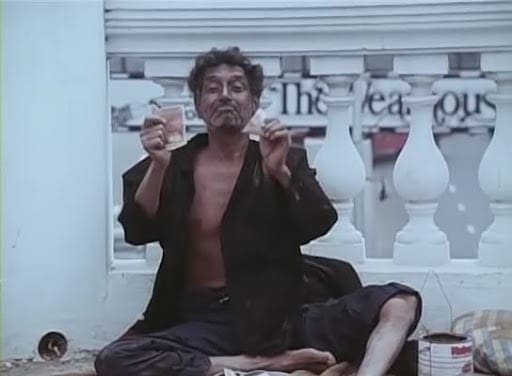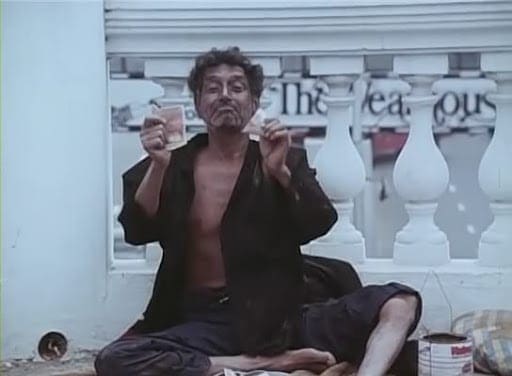
The first time I saw this movie was at a small theater in Thirthahalli, a small hill-station/town in the district of Shimoga, Karnataka. My cousins, all 14 of them and a favorite uncle accompanied me during the summer vacations at my maternal granny’s place at a time when it was still good to be in touch with your cousins and large extended families! I remember being thoroughly entertained by it, even though I did not understand the deeper nuances of the movie.
I watched the movie again, a few years later with a slightly better understanding and then every couple of years with a better insight each time. This review then is an insight into the masterpiece that is “Pushpak”, a truly multilingual film in that, everybody can understand it, whatever his/her nationality.

A Movie ahead of its time perhaps. A first multilingual movie without any dialogues, not truly a silent film, but a silent movie nonetheless. Set in the mid 1980’s this movie takes you back to a time when India was yet to be “liberalized” and still had that quaint innocence of a country that was yet to entertain foreign culture. When people still believed in family values and when children would still be playing outside, rather than sitting in front of a screen/monitor and wasting away their time.
Singeetham Srinivasa Rao’s Pushpak (occasionally going by its full title Pushpaka Vimanam) does manage to convey volumes without any dialogue. A simple story and an even simpler screenplay made it appeal to all classes of audience. It’s a black comedy with a social message, and though it contains a couple of symbolic moments that aren’t precisely subtle, it all the same manages to entertain and provoke thought.
Storyline: An unemployed graduate (played by Kamal) lives in a room located in the chawls of the city. Chance brings him to Amala but they do not have any conversation. By luck Kamal runs into a drunkard lying by the roadside presents him with an opportunity to take his identity and enjoy the stay in a star-hotel for a few days. There Amala stays across his room balcony with her parents. They love blossoms now and Kamal tries to impress her with his new found money. She rejects all the gifts he wants to buy her and asks for a bunch of flower on top of a dilapated building.
We see Kamal’s character hopelessly seeking a job in a market where there are only a few available, and a large number of unemployed citizens vying for those available positions. Money buys him temporary status, but it’s a rather hollow one.
The humour in ‘Pushpak’ is both satirical and pitch-black. The instances where the director uses the All India Radio news in the background to give effect to the scenes are awesome. This movie has got Comedy, Sentiments, Emotions, Suspense.
The character of the beggar, pictured here, is central to this motif. The best scene I like from this movie is when he meets a beggar on the road side. Kamal tries to show off by taking a few coins from his pocket and showing them to the beggar. The beggar then smiles and reveals many currency notes lying below the mat on which he is sitting. A perfect way of depicting that the protagonist is way worse off than even a beggar.
Much like the other well-remembered 80’s black comedy with a social consciousness, Jaane Bhi Do Yaaron, this film lives in a rather grim world.
Direction and Acting: Director Singeetham Srinivas Rao has done a tremendous job and so are the performances of Kamal, Amala, Tinu Anand, Prathap Pothan without whom this would not have been a hit. Young Kamal is in this as I usually find him: absolutely effortless in his acting, rather likable and charming. He is perfect for the role, though – starting out a little pathetic, then flamboyant in his rich turnabout. The romance with magician’s daughter Amala rather adorable, but the best part is the magician (Prathap Pothan) himself, whose little tricks kept me laughing out loud. The hired assassin (Tinu Anand) was also bizarrely hilarious. I won’t name his weapon of choice, but it’s really quite priceless.
On the whole, Pushpak is ‘Poetry in celluloid’.
Positives: A Strong and simple storyline.
A laidback India of the mid 80’s.
A total Family movie without any of the crass humor seen in today’s so called Comedies.
Negatives: Probably slow-moving for today’s generation.
Could have slicker editing.
Who can watch: For general viewing and will be liked by all audiences. A classic.
Release Date: 10.9.1987
Overall Rating: 4.5/5

Good article on a great film but there is no mention of the background score of L Vaidyanathan which was the soul of the film & was truly out of the world score
The magician is not Prathap Pothan but the friend of the drunkard who hires the professional killer is Prathap pothan. But you forgot the main character “the beggar” played by one of the finest actors P.L. Narayana. And according to me the best and the soulful scene of the movie is the death of the beggar in which people run for his money leaving his dead body on road… which ultimately makes Kamal rethink his
The magician is not Prathap Pothan but the friend of the drunkard who hires the professional killer is Prathap pothan. But you forgot the main character “the beggar” played by one of the finest actors P.L. Narayana. And according to me the best and the soulful scene of the movie is the death of the beggar in which people run for his money leaving his dead body on road… which ultimately makes Kamal rethink his life